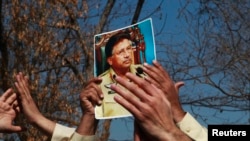ISLAMABAD —
A special court in Pakistan on Monday indicted former military ruler Pervez Musharraf on five counts of high treason.
Musharraf appeared before a three-member panel of judges amid tight security and pleaded not guilty to all charges against him.
The trial is being hailed as unprecedented in a country where the powerful military has staged three coups and its officers until now have enjoyed de facto immunity from prosecution in civilian courts.
Musharraf appeared before a three-member panel of judges amid tight security and pleaded not guilty to all charges against him.
This was only his second court appearance since the legal proceedings began three months ago. Musharraf has mostly remained under treatment in a military hospital near Islamabad. Defense attorneys have cited either security or health reasons for his previous absences, while critics have accused him of engaging in delaying tactics to obstruct the court.
“He (Musharraf) appeared before the court today. The formal charges were framed against him and he denied the charges. He stated he does not plead guilty,”
Prosecution attorney Sardar Asmatullah told reporters following Monday’s proceedings.
During the hearing, Musharraf declared he is not a traitor and highlighted the achievements he said Pakistan made during his nearly decade-long rule. The former president reiterated that he is prepared to face trial and defend his actions that he says were approved by the prime minister and Cabinet at the time.
Observers, however, say the former general's indictment on charges of treason marks a milestone for Pakistan’s political and legal history.
“It is unprecedented, obviously, to begin to seek some accountability, to hold to justice anybody at such a senior level in the military," noted Sam Zarifi, Asia Director for the International Commission of Jurists, or ICJ. "So potentially it is a very significant step forward and, of course, a lot now depends on how the trial itself proceeds.”
Zarifi said this is an opportunity for Pakistan’s judiciary to demonstrate that no one is above the law, and that it must ensure the trial fully complies with international standards.
“So, this is a step forward for the [Pakistan]courts to show exactly what a proper trial looks like and what kind processes defendants is entitled to,” he added.
Musharraf seized power in a military coup in 1999 by ousting then-Prime Minister Nawaz Sharif and later forcing him into exile. The military leader stepped down in 2008 to avoid impeachment and went into self-imposed exile a few months later.
He returned to Pakistan about a year ago to try to revive his political carrier but was barred from taking part in elections last May that returned Mr. Sharif to power for a third time. Musharraf’s lawyers accuse the prime minister of carrying out a political vendetta.
Musharraf appeared before a three-member panel of judges amid tight security and pleaded not guilty to all charges against him.
The trial is being hailed as unprecedented in a country where the powerful military has staged three coups and its officers until now have enjoyed de facto immunity from prosecution in civilian courts.
Musharraf appeared before a three-member panel of judges amid tight security and pleaded not guilty to all charges against him.
This was only his second court appearance since the legal proceedings began three months ago. Musharraf has mostly remained under treatment in a military hospital near Islamabad. Defense attorneys have cited either security or health reasons for his previous absences, while critics have accused him of engaging in delaying tactics to obstruct the court.
“He (Musharraf) appeared before the court today. The formal charges were framed against him and he denied the charges. He stated he does not plead guilty,”
Prosecution attorney Sardar Asmatullah told reporters following Monday’s proceedings.
During the hearing, Musharraf declared he is not a traitor and highlighted the achievements he said Pakistan made during his nearly decade-long rule. The former president reiterated that he is prepared to face trial and defend his actions that he says were approved by the prime minister and Cabinet at the time.
Observers, however, say the former general's indictment on charges of treason marks a milestone for Pakistan’s political and legal history.
“It is unprecedented, obviously, to begin to seek some accountability, to hold to justice anybody at such a senior level in the military," noted Sam Zarifi, Asia Director for the International Commission of Jurists, or ICJ. "So potentially it is a very significant step forward and, of course, a lot now depends on how the trial itself proceeds.”
Zarifi said this is an opportunity for Pakistan’s judiciary to demonstrate that no one is above the law, and that it must ensure the trial fully complies with international standards.
“So, this is a step forward for the [Pakistan]courts to show exactly what a proper trial looks like and what kind processes defendants is entitled to,” he added.
Musharraf seized power in a military coup in 1999 by ousting then-Prime Minister Nawaz Sharif and later forcing him into exile. The military leader stepped down in 2008 to avoid impeachment and went into self-imposed exile a few months later.
He returned to Pakistan about a year ago to try to revive his political carrier but was barred from taking part in elections last May that returned Mr. Sharif to power for a third time. Musharraf’s lawyers accuse the prime minister of carrying out a political vendetta.




